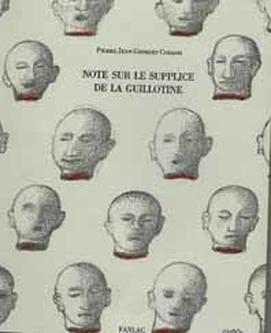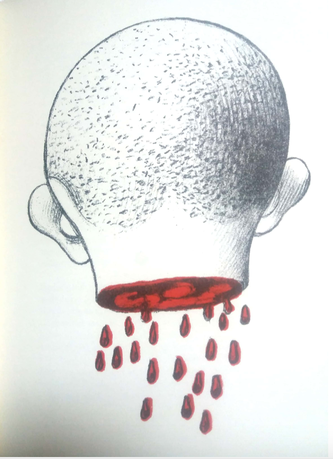|
During a recent visit to the Conciergerie, I picked up a prettily bound book, entitled Note sur le supplice de la guillotine. The book contained a short essay of that title by Cabanis, five drawings by the artist Cueco, and a discussion of the moral and political philosophy of the guillotine by French philosopher Yannick Beaubatie. For the main part, Cabanis's article, written 1799 (an IV) argues against recent articles that claimed that the torment of the guillotine ought to be abolished because it cannot be proven that the guillotined do not feel pain. The articles (by members of the medical profession, Cabanis's own colleagues), cite as evidence witnesses's reports of decapitated heads moving in such a way as to suggest that they responded to the situation, and attempted to communicate. One example they cite is that of Charlotte Corday, whose decapitated head was slapped by one of Sanson's valets, after which it apparently reddened as if in shame and indignation. Cabanis answers that while he was not present at any decapitation (as he did not have the stomach for it) he was present at the testing of the machine and certifies that death must be instanteanous. He then goes on to discuss the philosophical question of where pain resides, and the medical phenomenon of bodily movement after death. At the end of the essay, Cabanis offers his moral and political reflections: the death penalty, he claims, ought to be abolished. But if it is not, the guillotine has to go. Not because it causes pain to its victim, but because it is too swift so that as a performance of a punishment it cannot serve its rightful purposes. Beaubatie takes this up in a fascinating discussion. In particular, he notes a resemblance between Cabanis' s reservations about the guillotine and Beccaria's utilitarian theory of punishment. Beaubatie notes further that Beccaria and Cabanis both frequented the Helvetius home, although two years apart. What Beaubatie does not note, however is the strong resemblance between Cabanis's thought and that of his sister in law and long term friend and collaborator Sophie de Grouchy. Cabanis's principal reason for thinking that the guillotine should not be used is not - as Beaubatie claims - that it cannot serve as an exemple or detterrent, but that it does not allow enough time for spectators to react emotionally in such a way that would help their sympathy grow. The guillotine’s work is done in less than a minute. That it did not occur to Beaubatie, in his commentary written in 2002, to look to his long term philosophical correspondent Sophie de Grouchy for influence, as well as to Beccaria (whose path with Cabanis crossed, but two years apart) is a sign of how much work has been done over the last fifteen years in recovering the works and influence of women philosophers.
1 Comment
1/20/2022 03:41:46 am
I never knew that Cabanis' paper, published in 1799 (an IV), refutes recent arguments that the guillotine should be banned since it is impossible to establish that those who are guillotined are not in agony. I never thought that it would be like this, I'll share this with my aunt. Thank you for the information about guillotines.
Reply
Leave a Reply. |
About
This is where I live blog about my new book project, an intellectual biography of three French Revolutionary women philosophers. Categories
All
Archives
November 2022
|


 RSS Feed
RSS Feed